Trump Sues States Over Climate Action
Air Date: Week of May 9, 2025
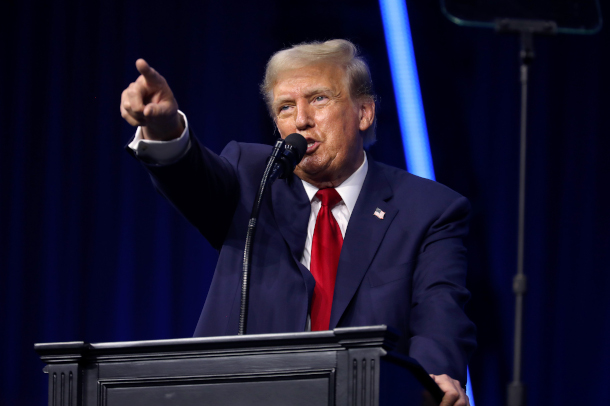
On his 2024 campaign trail, President Trump pledged to push back against state climate efforts. However, legal experts noted that his decision to preemptively strike against lawsuits that had yet to be filed was an unusual move. (Photo: Gage Skidmore, Flickr, CC BY-SA 2.0)
At the direction of President Donald Trump the U.S. Department of Justice has sued four states -- Vermont, New York, Hawaii, and Michigan -- that are trying to recover some climate costs from major fossil fuel companies through climate superfund laws and litigation. Vermont Law and Graduate School Emeritus Professor Pat Parenteau joins Host Aynsley O’Neill to explain why he views the DOJ cases as frivolous extensions of the other actions the Trump administration has taken to aid the fossil fuel industry.
Transcript
DOERING: From PRX and the Jennifer and Ted Stanley Studios at the University of Massachusetts, Boston, this is Living on Earth. I’m Jenni Doering.
O’NEILL: And I’m Aynsley O’Neill.
The U.S. Department of Justice is suing four states to prevent them from holding fossil fuel giants accountable. New York and Vermont have already passed Climate Superfund laws, based on a “polluter pays” model that requires fossil fuel companies to pay their fair share of the huge costs of fixing and preventing climate damage. These laws have become the focus of lawsuits from fellow states, fossil fuel industry groups, and now, the Trump administration. Meanwhile, the Trump DOJ also preemptively sued Hawai’i and Michigan for their separate planned litigation against oil companies. These cases have all been filed in the U.S. court system, but the potential ramifications could reverberate around the globe. For more on this, we turn now to Pat Parenteau, Emeritus Professor at Vermont Law and Graduate School, who was also a former EPA Regional Counsel. Pat, welcome back to Living on Earth!
PARENTEAU: Thanks, Aynsley, it's nice to be with you.
O'NEILL: Now, Pat, you have five decades of experience in environmental law here in the United States. How surprised are you at this latest action from the Trump administration?
PARENTEAU: Maybe the term is gobsmacked. I didn't think I could be surprised by anything this administration would do, but frankly, I am. For the first time I've ever experienced, the federal government has sued two states, Hawai'i and Michigan, to try to stop the states from bringing litigation against the major oil companies for the damage that climate change is doing in their states. That's never happened before. These cases have no merit. There's really no legal basis for these cases. They're purely intimidation tactics. But it's quite remarkable that the United States Department of Justice would think that these kinds of cases are high priorities. But of course, the President is directing them to attack states that he believes are interfering with his plans to make America energy dominant, meaning dominant in fossil fuels. Not dominant in renewables, not even dominant in a mixture of fossil fuel and renewables, just dominant in fossil fuels. And from an international law standpoint, I mean, it's just going to mean that the United States is falling further behind on the commitments it's made through the Paris Agreement. Now I know we've withdrawn from the Paris Agreement. That was not a smart thing to do, but we've done it. The more that the Trump administration not only withdraws from international negotiations and cripples the ability of the United States agencies like the Environmental Protection Agency to reduce emissions, but now they're going after the states and preventing the states from stepping up and filling the gap. So right now, the United States is truly a pariah nation on Earth.
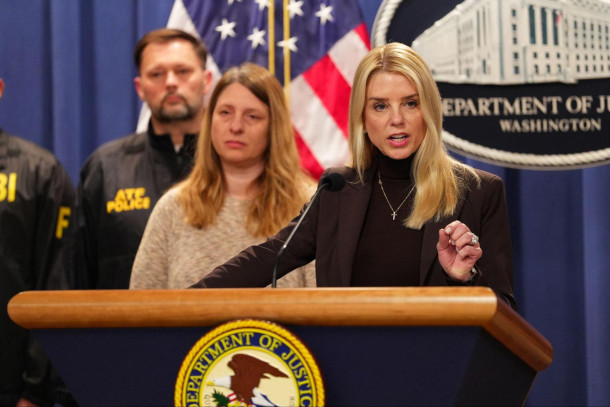
Attorney General Pamela Bondi referred to Vermont and New York’s climate superfund laws, as well as Hawai’i and Michigan’s climate lawsuits, as “burdensome and ideologically motivated.” (Photo: United States Department of Justice, Wikimedia Commons, Public Domain)
O'NEILL: So Pat, there are two different climate lawsuits here, one against New York and Vermont and one against Michigan and Hawai'i, right? Walk us through the highlights of these two cases.
PARENTEAU: Yeah, the claims or the arguments that the Trump administration is making are essentially the same in the cases that they brought to preempt Hawai'i and Michigan, and in the cases they've now brought to stop Vermont and New York from implementing their state laws. We call these Climate Superfund laws because they're based on the now famous remedy under the Superfund, the federal Superfund law, which means you can be liable for the pollution that your products are causing. Even if you didn't violate any laws, even if you're not at fault in any sort of legal way, you're simply liable because the result of you marketing and producing these products is it's causing damage and causing the states to incur costs to deal with the damage and to adapt to the effects of climate change. And so we call this a cost recovery action. And what the Trump administration is saying is that all of these state laws are preempted by federal law, constitutional law, they raise a whole slew of constitutional arguments. For example, they say the Clean Air Act preempts these cases. Which is kind of ironic, right, because Administrator Zeldin of the EPA has proposed to repeal basically all of the regulations under the Clean Air Act. He's proposed to repeal what's called the endangerment finding that was made back in 2009 and that's the finding that's required for the federal government to regulate greenhouse gas emissions under the Clean Air Act. So that argument that the Clean Air Act preempts state law is really cynical, right? Because they're also proposing to take away EPA's authority to regulate these sources. But there are other arguments they're making. They're saying it's interfering with foreign relations. That's pretty ironic, because we've just pulled out of the Paris Agreement. The United States won't even be present at the next Conference of the Parties, the COP meeting that's coming up in November. So we're not engaged at all in international negotiations, at least on climate. They're also arguing that it's interfering with interstate commerce. You know, the federal government has authority to regulate interstate commerce, and they're saying these lawsuits will make it more difficult to do that, and conflict with the federal government's preference for fossil fuel development. If it makes it more expensive to develop fossil fuels, their argument is, that's an interference with interstate commerce.
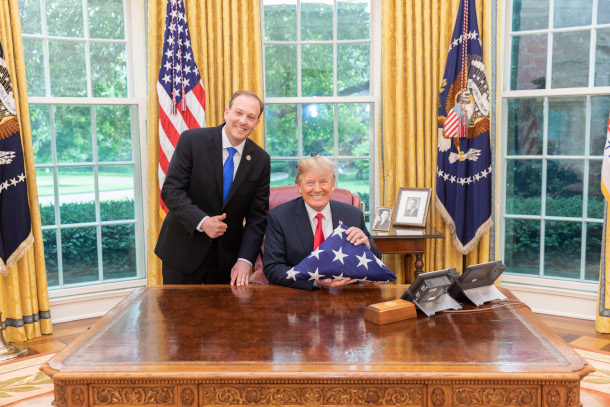
The Trump administration says one reason for pushing back against these state laws is because they are superseded by federal laws on climate change. At the same time though, Lee Zeldin (left), as head of the Environmental Protection Agency under President Trump (right), has made overtures towards ending the EPA’s endangerment finding, which is the foundation for the Clean Air Act’s ability to regulate climate-warming greenhouse gas emissions throughout the country. (Photo: Shaleah Craighead, Wikimedia Commons, Public Domain)
O'NEILL: Now Pat, for legal clarification here, Hawai'i and Michigan haven't even really moved forward with this litigation yet. How is it that the Trump administration can file a preemptive lawsuit for something that hasn't happened yet?
PARENTEAU: Well, no government has ever done that, and in fact, Hawai'i immediately filed their lawsuit the day after they were sued by the Department of Justice. Michigan has said they intend to file their lawsuit when they're ready, and they're not going to be intimidated by this preemptive strike from the Trump administration. I happen to think it's more of a political stunt, frankly, than a serious legal attack. I think what's going to happen is the Justice Department will amend the lawsuit they've already filed against Hawai'i to say, well, now we're just going to challenge the lawsuit that Hawai'i has brought based on their state law. And when Michigan files its lawsuit, they'll do the same thing. So in the end, the preemptive cases they filed against Hawai'i and Michigan will turn out to be the same kinds of cases the Trump administration has now filed against Vermont and New York. In the end, the states, all four of them, Hawai'i, Michigan, Vermont, New York, are all going to have to fight, not only with the federal government, but they're also going to have to fight with 24 states, red states, as we say, because all of those states have filed against New York and Vermont, and I'm sure that they will follow and sue Hawai'i and Michigan as well. And then in addition, you have lawsuits that have been filed by the Chamber of Commerce and the American Petroleum Institute against New York and Vermont. So you're going to have a three-ring circus of litigation against the states trying to collect damages from the oil companies. It's going to be the federal government, it's going to be these trade associations, and it's going to be the red state Attorneys General. So all of a sudden, the stakes in these cases have grown enormously.
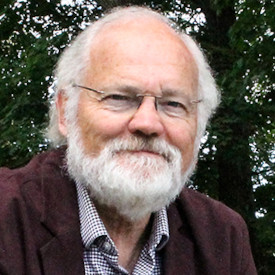
Pat Parenteau is an emeritus professor of law at Vermont Law and Graduate School. He is also a former EPA regional counsel. (Photo: Vermont Law and Graduate School)
O'NEILL: Well, Pat, so what happens next?
PARENTEAU: Right, so the first round of arguments is going to be over whether these challenges from these parties that I've mentioned against the states, are going to move forward to trial or to what we call summary judgment. And the states, I'm quite sure, are going to move to dismiss the Trump administration, dismiss the state Attorneys General, dismiss the Chamber of Commerce. The states are going to try to knock out these lawsuits that are challenging them. So that will be the first round of litigation. Are these cases going to proceed that are challenging the states, or are they going to get dismissed? If, as I think, they will get dismissed, it's not for sure, but let's say there's a good chance they'll get dismissed. Then you have to think about, okay, well, then they have to go up on appeal. And when you're talking about Vermont and New York, the appeal is to the Second Circuit US Court of Appeals in New York City. If you think about Michigan, that's the Sixth Circuit Court of Appeals in Cincinnati. And if you think about Hawai'i, that's the Ninth Circuit Court of Appeals in San Francisco. So all of a sudden now, you've got litigation moving up through the federal judicial process in different circuits, which is going to take quite a long time. In the meantime, the states of New York and Vermont are going to be sending a bill to the oil companies, Exxon and others, claiming that here's the amount of money we claim you owe us for the damage being done by climate change. Those cases will be in state court, so that's going to have to work their way up through state court proceedings and potentially eventually to the United States Supreme Court. So all roads seem to lead to the US Supreme Court for me, and it will be years before it gets there. That's why I say that these cases may outlive me. I hope not, but they could. They're going to take a very long time.
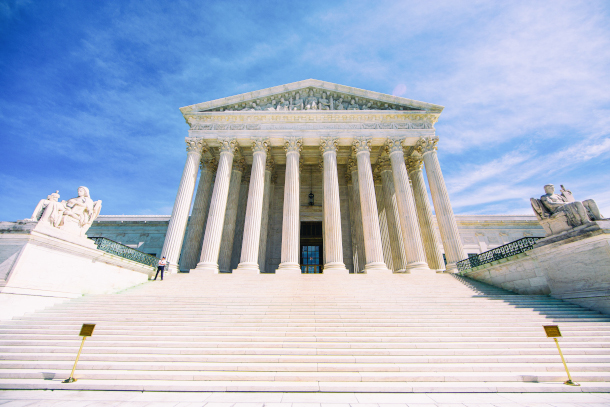
Pat Parenteau’s perspective is that these cases will eventually end up in the US Supreme Court, though with the common pace of litigation, it is likely to be a long time before they do. (Photo: Thomas Hawk, Flickr, CC BY NC 2.0)
O'NEILL: Pat Parenteau is an emeritus professor of law at Vermont Law and Graduate School. Pat, as always, thank you so much for taking the time with me today.
PARENTEAU: Thank you, Aynsley. Be well.
O’NEILL: We reached out to the Department of Justice for comment regarding these lawsuits, and they pointed us back to their press release. In it, Attorney General Pamela Bondi referred to the Climate Superfund laws and the lawsuits against the fossil fuel industry as “burdensome and ideologically motivated”. She also said they “threaten American energy independence and our country’s economic and national security.”
Links
Reuters | “Trump Administration Sues Four Democratic-Led States to Block Climate Laws, Lawsuits”
Listen to our previous interview about the New York Climate Change Superfund Law
Living on Earth wants to hear from you!
Living on Earth
62 Calef Highway, Suite 212
Lee, NH 03861
Telephone: 617-287-4121
E-mail: comments@loe.org
Newsletter [Click here]
Donate to Living on Earth!
Living on Earth is an independent media program and relies entirely on contributions from listeners and institutions supporting public service. Please donate now to preserve an independent environmental voice.
NewsletterLiving on Earth offers a weekly delivery of the show's rundown to your mailbox. Sign up for our newsletter today!
 Sailors For The Sea: Be the change you want to sea.
Sailors For The Sea: Be the change you want to sea.
 The Grantham Foundation for the Protection of the Environment: Committed to protecting and improving the health of the global environment.
The Grantham Foundation for the Protection of the Environment: Committed to protecting and improving the health of the global environment.
 Contribute to Living on Earth and receive, as our gift to you, an archival print of one of Mark Seth Lender's extraordinary wildlife photographs. Follow the link to see Mark's current collection of photographs.
Contribute to Living on Earth and receive, as our gift to you, an archival print of one of Mark Seth Lender's extraordinary wildlife photographs. Follow the link to see Mark's current collection of photographs.
 Buy a signed copy of Mark Seth Lender's book Smeagull the Seagull & support Living on Earth
Buy a signed copy of Mark Seth Lender's book Smeagull the Seagull & support Living on Earth

